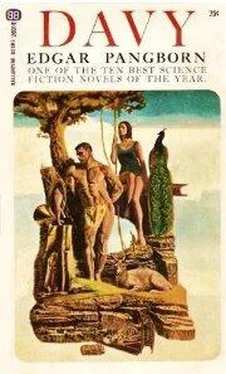I saw her once again, dressed in white with the other pilgrims, at the funeral two days later. If she knew where we were sitting she thought best not to look our way… It seems to me now that I loved her a great deal, maybe as much as I loved Caron who is probably dead.
* * *
I remember now a decree I pronounced from that throne on the steps of the presidential palace. The evening was wearing on; they’d brought us a musky wine that went to our heads. I decreed that everyone without exception must immediately live happily ever afterward; somehow I could think of no more fitting decree from a King of the Fools.
After the funeral — dismal enough it was, and our Jed would have thought it finer than he deserved — Sam and I didn’t wait for the coach that might go by on Saturday, but decided to chance it on foot at least as far as Humber Town.
In East Perkunsvil after the disaster I heard virtually no talk about the tiger, and not even a sidelong mention of his possible return. The village Guide brought back his hunting party the next day — sorry, angry men they were when they heard the news — and in the afternoon men went out to cultivate the corn patches with no protection but a couple of bowmen. That night also, men were outside minding watchfires, not against tiger but just to keep the grazing creatures away from the corn. Hunters and old wives and other founts of absolute wisdom agree that unless old or sickly, a tiger will attack a particular village only once in a season, and then move on. It could even be true, though I doubt it.
The senseless, accidental quality of the event was what shook and overwhelmed me, I think. Sam stood by me; we didn’t talk much; he was just there, letting me be alone with myself in his presence. Nickie is the only other I’ve known who can do that. [20] I will praise my love for the honey of his words — honest, Spice, it’s simply a matter of keeping one’s mouth shut in a pleasant tone of voice. — Nick.
When the funeral was over and we were on the road again, I was beginning to understand how if there is any order, meaning or purpose in the human condition, human beings must make it themselves.
We made an early morning start. On such a summer morning, a west wind running along the hills and the sun not quite risen, a freshness everywhere, a ripple of birds’ music, a glimpse of a whitetail deer slipping into the daytime secrecy of the forest, the warmth of the present and the surging life of your own blood make up the whole aspect of truth — how else could it be?
Humber Town is a busy and ambitious place, too small for a city, too large for a village — say about six or seven thousand population and, to use a quaint local expression, growing all the time. On the road Sam and I chewed over a few plans but settled nothing. I still desired Levannon, and the ships. But I had been noticing how often a plan is a scribble on the wind. Sam allowed that, to keep us going, he might look up some journeyman carpentry or mason work — he knew both trades — in Humber Town. He agreed it would be safest to move over into Levannon, if there stifi was a war going on by the time we reached Albany on the Hudson Sea. At East Perkunsvil the only war news they had was whispery rumors about a battle at Chengo in the west, and another on the Hudson coast a little north of Kingstone, barely outside Katskil territory.
Sam and I had not spoken at all of the relation that might exist between us. But as we were coming up to the gates of Huinber Town I said: “If’n you want to be my Da and I want it thataway, it maybe don’t matter if I was or wa’n’t out’n the actual seed?”
“Why, that’s about the way I had it lined up to myself, Davy,” he said. He’d been calling me Jackson as usual that morning. “We might leave it at that…”
The gate guard was happy about something, which made him show uncommonly good manners for a policer. As he let us in I heard the brisk tinkle and thrill of a mandolin somewhere. Then a drum was warming up oom-ta-ta oom-ta-ta, and a flute and a pretty sharp cornet jumped in, not quarreling at all, with the “Irish Washerwoman.” It was happening out of sight around a curve of the main street, not far away. Wherever the Washerwoman came from, and I believe it was Old Time, she’s a grand durable quail and always welcome. “There they go!” the guard said to us, and I saw his feet were interested, and so were mine. “Best damn gang ever was here. You be strangers to Humber Town?”
“I was by, yeahs ago. Sam Loomis, and this ’ere’s my boy Jackson — Jackson David Loomis. Who be they, sounding off?”
“Rumley’s Ramblers.”
“Ayah?” said Sam. “Well, that comet’s got a power into it, but he don’t blow as good as my boy…”
A small idle crowd was already lounging at the rail fence that bordered the town green, though no special show was going on and it was only mid-morning, when most of the townfolk would be at work. The musicians had drifted together and tuned up to amuse themselves, that was all. But nobody with ears and eyes would just walk by, not with Bonnie Sharpe cross-legged on the grass tickling her mandolin, and Minna Selig with her banjo, and Stud Dabney teasing his drum to funny stuff with his white head stuck out over it and his squabby body in a kind of crouch, like a snowy owl about to fly away. Little Joe Dulin was there too tweedling his flute, and big Tom Blame stood back of him — far back, following a rule of his own, for Tom always insisted he couldn’t make his cornet cough up a decent tone unless there was a plug of good tobacco stuffing a hole where a couple of teeth were long gone, which meant spitting at the end of near-about every bar; and he couldn’t spit good, he claimed, unless he was free to swing his head real liberal and fair warning to the world. Uhha, Tom was there in all his glory, as Sam and I joined the other loafers to rest our feet on the rails — Long Tom Blaine pointing his crazy comet at the sky, a man drinking music and turning his head quick as a cat to spit and drink again. Hoy, so I’m running on ahead of myself and don’t care. These were people I soon began to know and love; when I touched my pen their names came tumbling out.
The green was large and nicely designed — everything appeared spacious and rather different in Humber Town, or else I’m remembering it better than it was because that was where a good time of my life began, my time with Rumley’s Ramblers. The wagons made a neat square within the green; I saw the big randy pictures and strong colors all over the canvas tops and sides, and the well-fed heavy-muscled mules tethered out where they could find shade and space to move about without bothering anyone.
Rumley’s was a good-sized gang, with four of the large covered mule-wagons and two of the ordinary kind for hauling gear and supplies. The covered wagons — nothing like the rattletrap vans the gyppos use — are for the gang to dwell in whether they’re on the move or in camp. One long covered wagon can provide cubby-hole quarters for more than eight people with their possessions, and you won’t be too cramped so long as the clothes and things — dudery, to use the Rambler word — are properly stashed away. It’s a thing you learn, and once you do, why, it’s rather like living on shipboard and is not a bad way to live at all.
The musicians had polished off the Washerwoman by the time Sam and I got there. The girl with the mandolin was strumming aimlessly; the other had put down her banjo, and when she caught my eye and maybe Sam’s her hand went up to her black curls in that feminine hair-fixing motion which goes back to the time when (Old-Time science says) we were living in unsanitary caves and women had to pay attention to the hairdo so that the mammothbones they got hit with would bounce gracefully. Minna Selig was a charming bundle, but then so was Bonnie Sharpe. For some tinie — near six months as I remember — I could hardly focus on one without being suddenly hornswoggled by the other. They planned it that way.
Читать дальше












